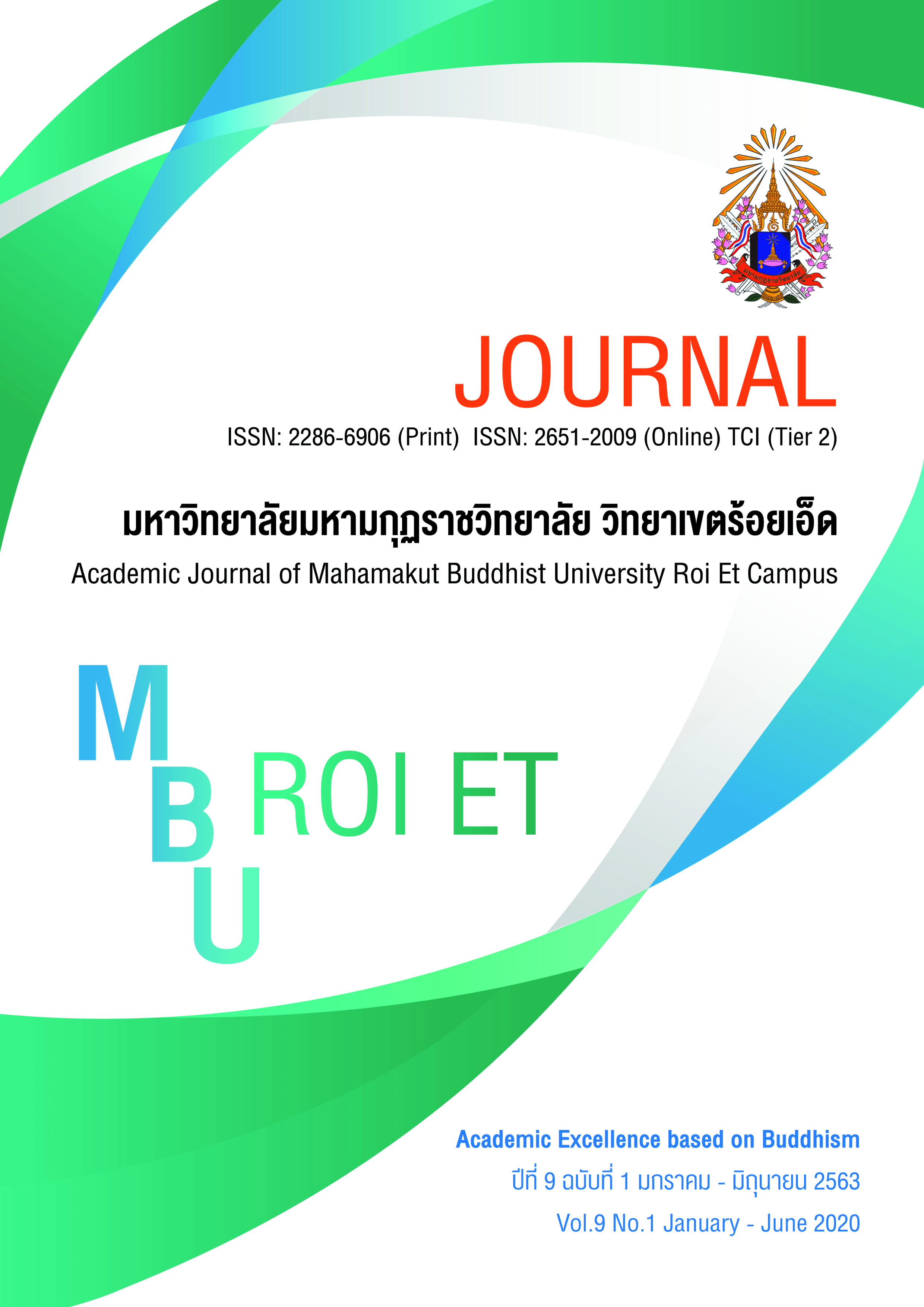Development of desirable behavior of students according to the moral identity of the school moral schools Consisting
Main Article Content
Abstract
The Objectives of the research article were to 1) create guidelines for developing desirable behaviors according to the moral identity of the moral school 2) develop desirable behaviors according to morality, identity of virtue schools 3) evaluate the moral school youth camp program Virtue. The target group is the school in the school network group 14. There are 7 schools in the sample group. 200 people, 18 teachers and administrators, a total of 218 people. Qualitative data analysis depicts events related to the activities by reporting the data analysis of each activity according to the objectives set and analyzing the data is quantitative, using basic statistics such as percentage values, average values and standard deviations as data in comparison with goals or shows the changes that occur by the round value as a 5-level evaluation according to the style of Likert.
The results of the research found that 1) guidelines for developing desirable behaviors of students according to moral identity for moral schools Consisting of (1) activities aimed at creating participation (2) activities aimed at increasing reasoning skills in analytical thinking (3) activities aimed at increasing life skills (4) The activities that focus on students are important. (5) Activities that meet the interests, aptitudes and needs of all students. (6) Activities that reflect the actual context of the school. (7) Assess learning outcomes from real conditions. (8) Activities that can be taken. Applied in the classroom, all 8 activities mentioned above are guidelines for developing the desirable behavior of students in order to be in accordance with the people, the identity of the school. With name, honesty, diligence, responsibility, discipline, perseverance, determination in learning, patience, tolerance, unity, kindness, kindness, politeness, respect, sufficiency, economical, with public mind which adheres to the important principles of development School of virtue, ethics, etc. 2) The result of changing the behavior of students according to moral identity for the moral school found that they meet the goals set by the students. With more desirable behaviors and reduced undesirable behaviors, good results for families, schools, pores and society. 3) The evaluation of the moral youth camp project found that overall, participants in the project saw that they were at a high level The speaker explained the steps How to make and summarize issues clearly, easy to understand, followed by students think that training is beneficial to themselves.
Article Details
References
ไพศาล มั่นอก และ ไพฑูรย์ สินลารัตน์. (2557). การวิจัยเชิงปฏิบัติการแบบมีส่วนร่วมในการพัฒนาคุณธรรมจริยธรรมของนักเรียน ระดับมัธยมศึกษาขนาดเล็ก : กรณีศึกษาของนักเรียนโรงเรียนวิเศษชัยชาญ. วิทยาคมวารสารสุทธิปริทัศน์. 28(88). 99-117.
ระพีพัฒน์ หาญโสภา. (2557). การประเมินโรงเรียนวิถีพุทธ. วิทยานิพนธ์ศึกษาศาสตรมหาบัณฑิตสาขาวิชาการบริหารการศึกษา. มหาวิทยาลัยขอนแก่น.
ศูนย์โรงเรียนคุณธรรม มูลนิธิยุวสถิรคุณ. (2559). คู่มือการจัดกิจกรรมพัฒนาโรงเรียนคุณธรรม. กรุงเทพมหานคร : สหมิตรพริ้นติ้งแอนด์พับลิสซิ่ง.
สมปอง ใจดีเฉย และคณะ. (2554). การสังเคราะห์องค์ความรู้กระบวนการสร้างโรงเรียนต้นแบบด้านคุณธรรม จริยธรรม. กรุงเทพมหานคร : ศูนย์คุณธรรมและคณะศึกษาศาสตร์ มหาวิทยาลัยศรีนครินทรวิโรฒ.
สำนักงานพัฒนานวัตกรรมการจัดการศึกษา สำนักงานคณะกรรมการการศึกษาขั้นพื้นฐาน. (2561). โรงเรียนคุณธรรม สพฐ. มาตรฐานและตัวชี้วัด. สืบค้นเมื่อ 4 กุมภาพันธ์ 2562. จาก http://www.pkt.ac.th/moral/
สำนักงานพัฒนานวัตกรรมการจัดการศึกษา สำนักงานคณะกรรมการการศึกษาขั้นพื้นฐาน. (2561). โรงเรียนคุณธรรม สพฐ. ค่ายยุวชนคนคุณธรรม. สืบเมื่อวันที่ 4 กุมภาพันธ์ 2562. จาก http://www.pkt.ac.th/moral/
สุพรรณี ไชยอำพร. (2551). รูปแบบแหล่งเรียนรู้ด้านคุณธรรมเพื่อการพัฒนาชุมชนอย่างยั่งยืน. วารสารพัฒนาสังคม. 10(2). 1-24.
สุระ อ่อนแพง ปัญญา สังขวดี วิทยา จันทร์ศิลา และสำราญ มีแจ้ง. (2556). รูปแบบการบริหารเพื่อพัฒนาคุณธรรม จริยธรรมนักเรียนระดับประถมศึกษาในสถานศึกษาสังกัดสานักงานเขตพื้นที่การศึกษาประถมศึกษา. วารสารศึกษาศาสตร์ มหาวิทยาลัยนเรศวร. 15(ฉบับพิเศษ). 258-265.
Mills,G. E. (2007). Action research: A Guide for the teacher researcher. 3nd ed. New Jersey: Merrill Prentice Hall.
Likert, Rensis A. (1961). New Patterns of Management. New York : McGraw-Hill Book Company Inc.


